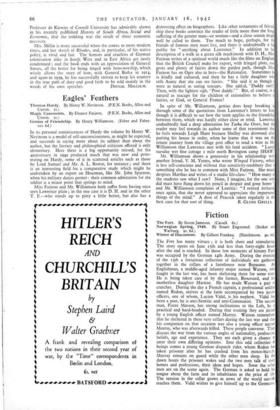Eagles' Feathers
IN its personal reminiscences of Hardy the volume by Henry W. Nevinson is a model of self-unconsciousness, as might be expected, and succeeds in saying more about its subject than about the author, but the literary and philosophical criticism offered is only elementary. Here there is a big opportunity missed, for the anniversary in 1940 produced much that was new and pene- trating on Hardy, some of it in scattered articles such as those by Lord Samuel and Mr. A. L. Rows; for instance ; and there is an interesting field for, a comparative study which might be undertaken by an expert on Housman, like Mr. John Sparrow, when his military duties permit : their common admiration for the soldier is a minor point that springs to mind.
Miss Farjeon and Mr. Williamson both suffer from having once seen Lawrence plain ; in the one case it is D. H. and in the other T. E.—who stands up to piety a little better, but also has a
distressing effect on biographers. Like other testaments of friend ship these books convince the reader of little more than the long suffering of the greater man—or woman—and a close season mi well be called to them. Too much to hope, perhaps, for friends of famous men must live, and there is undoubtedly a b. public for "anything about Lawrence." In addition to h description of a walk in a green silk mackintosh with D. H., Mis Farjeon writes of a spiritual world much like the films on Engla that the British Council make for export, with fringed plots, ro grots and plenty of fairies down the garden path, though Mi Farjeon has an Ogre also in hers—the Rationalist. Sometimes is kindly and cultured, and then he has a little daughter w tells Aunty that she can see fairies. "She said it as though were as natural as seeing teacups. She addzcl, Daddy can't Then, with the lightest sigh, 'Poor daddy.'" But, of course, it i natural as teacups for the children of rationalists to believe fairies, or God, or General Franco !
In spite of Mr. Williamson, genius does keep breaking through some of the quotations from Lawrence's letters to hi though it is difficult to see how the term applies to the friendship between them, which was hardly either close or tried. Lawren undoubtedly had a deep admiration for Tarka the Otter, but the reader may feel towards its author some of that resentment that he feels towards Leigh Hunt because Shelley was drowned after putting his house in order, when he learns that it was on the return journey from the village post office to send a Wire to Mr. Williamson that Lawrence met with his fatal accident. "Lunch tuesday wet fine cottage r mile north Bovington camp SHAW."
Mr. Williamson shows a generosity in his relationship with another friend, V. M. Yeates who wrote Winged Victory, which is less self-conscious and without that sensitivity-snobbery that is something else he has in common with Miss Farjeon. She much despises Marthas and writes of a studio life-class : "How many of the students saw what I saw? None, I imagine, for the one who did must have flung down his pencil in despair and gone home"; and Mr. Williamson complains of Loetitia : "I retired irritated, once again, that she never appeared to appreciate the impersonal things of the mind." A dose of Peacock taken regularly is the


























 Previous page
Previous page